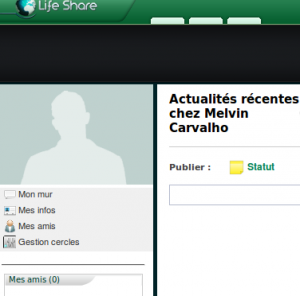Read Write Web — Monthly Open Thread — (October 2012)
Summary
Lyon, France witnessed around 500 of the top minds on the web, gathering for, TPAC 2012. There were many great workshops and events as well as unconference style ‘breakout sessions‘. It was also the first opportunity for the RWW CG to have a face to face meeting, which I think everyone in attendance, thoroughly enjoyed.
We were also able to have some great interactions with the Linked Data Profile Working Group, who suggest that RWW using their upcoming REC track standards for building apps, would be a good fit. A milestone was reached with the publication of Linked Data Platform 1.0 Draft.
Some excellent RWW sessions, together with WebID and Federated Social Web sessions were chaired by, among others, Henry Story. Timbl generously gave us the best part of his time for the first two days, as we tried to hammer out some conceptual aspects of identity on the web and a plan to move forward for the short to medium term. There was much interest in the workshops and breakout sessions, which were mostly standing room only. Henry has sent a number of excellent reports to the mailing list covering the work done at TPAC.

Communications and Outreach
TPAC took centre stage as dozens of new connections were made, as well as, existing ones strengthened. IBM and Boeing showed interest during our workshops, as well as cloudiway, the dutch fire department and many more. Good work has already taken place between RWW members and the linked data profile team, which is hopefully a good sign of things to come.
There was some great dialogue with identity people at microsoft, chatting to microformats and some very impressive work by Mozilla. In general it was an energizing event, and I would cautiously suggest there has been an uptick in interest, from a wide range of participants.
Community Group
Lots of work happened this month prior to TPAC, in particular two proposals caught the eye. The first of which, rww-0 interop, describes a baseline set of tests that will provide a scalable identity, authentication and authorization structure for the read write web. The second was a set of use cases that could be used to model a rich social networking system such as facebook.
One positive to come out of TPAC is an appreciation of a clean modular architecture to emphasize a separation of concerns between, identification, authentication and authorization.
The RWW enjoyed its first F2F meeting, which I think exceeded all expectations. Perhaps the only criticism might be that we didnt have enough time to spend together, as many were only able to attend for short periods. Still much work got done, with many presentations and demos. We were able to demonstrate data.fm compliance to access control, provision everyone in the room with an identity, and show interop of various systems.
Applications
An interesting new web scale distributed social system under development, lifeshare, was demoed at TPAC. Currently it is in the French language, but there is ongoing work to improve it. One to watch!
There were also nice demos from cloudiway who plan to roll out their system to 15,000 students by end of year. My-profile.eu, which we’ve covered before, was demoed in a number of areas, and is now available as a virtual machine. Good luck to Andrei who is heading off to work with the team at MIT/DIG. That said, the above is only a small snapshot of all the presentations and demos that took place, there were many more people than I can name, that made awesome contributions.
Last but not least…
Ubuntu have announced an integration of WebApps on the desktop. The integration is a conservative first step but seems to be pretty well done so far. With Ubuntu predicted to ship on 5% of PCs worldwide next year, this could be the start of an interesting marriage between the web and the desktop!





